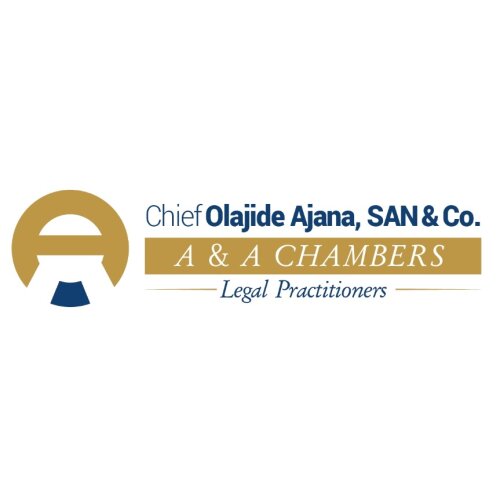Best Sanctions & Export Controls Lawyers in Akure
Share your needs with us, get contacted by law firms.
Free. Takes 2 min.
List of the best lawyers in Akure, Nigeria
About Sanctions & Export Controls Law in Akure, Nigeria
Sanctions and export controls refer to laws and regulations that restrict or regulate how goods, services, technology, and funds are transferred across national borders. In Akure, Nigeria, these laws are enforced to comply with both national security imperatives and international obligations, such as United Nations or African Union sanctions. Sanctions may target specific countries, entities, or individuals, while export controls typically decide which goods or technologies require government approval before leaving Nigeria. This legal field aims to prevent the transfer of items that could threaten security, breach international agreements, or support criminal activities. Local businesses, individuals, and organizations in Akure need to be aware of these regulations to avoid severe penalties.
Why You May Need a Lawyer
Legal guidance is often necessary for navigating the complexities of sanctions and export control laws in Akure, Nigeria. Here are some common situations in which you might require legal help:
- When exporting goods or technology and needing to determine if special licenses or approvals are necessary
- If your business faces allegations of sanction violations or is under investigation
- For due diligence when entering contracts with suppliers or partners based in countries subject to sanctions
- When you are uncertain about how changes in Nigerian or international law affect your business activities
- If you receive a notification from Nigerian authorities regarding potential breaches
- To understand the compliance requirements for your industry or products
- When seeking to appeal or respond to enforcement actions or fines
A lawyer familiar with sanctions and export controls law in Akure can help protect your interests, ensure compliance, and minimize the risk of financial or reputational harm.
Local Laws Overview
In Akure, Sanctions and Export Controls laws are shaped primarily by Nigerian federal legislation and regulations. Key statutes include the Customs and Excise Management Act, Export Prohibition List (Schedule), and Nigeria’s implementation of international sanctions. The Nigerian Export Promotion Council (NEPC) regulates exports and issues necessary guidelines, while the Central Bank of Nigeria (CBN) may enforce financial restrictions relating to sanctioned entities.
Specific areas relevant to Akure include:
- Prohibited Exports: Certain items and raw materials cannot be exported due to national security or preservation concerns.
- Licensing: Exporting controlled goods, including technology, minerals, or endangered species, requires obtaining the correct licenses from agencies such as the NEPC or the Ministry of Trade.
- Sanctions Enforcement: Nigeria enforces international sanctions lists, so businesses and individuals must ensure they do not transact with blacklisted persons, companies, or countries.
- Financial Controls: The CBN may block transactions or freeze assets linked to sanctioned parties.
- Record-Keeping: Businesses must maintain thorough documentation on all exports for regulatory review and compliance purposes.
Failure to comply with these laws can result in confiscation of goods, fines, loss of export privileges, or even criminal prosecution.
Frequently Asked Questions
What are sanctions and export controls?
Sanctions are restrictions imposed on activities or transactions with certain countries, entities, or individuals, often for national security or foreign policy reasons. Export controls regulate which goods, services, or technologies can be sent abroad and under what conditions.
Who enforces these regulations in Akure, Nigeria?
Regulations are enforced by multiple agencies including the Nigerian Customs Service, the Nigerian Export Promotion Council, and, for financial matters, the Central Bank of Nigeria.
What goods are most commonly controlled or restricted?
Agricultural products, raw minerals, petroleum, endangered wildlife, and sensitive technologies are commonly controlled. Specific items may also appear on the Export Prohibition List.
Do I need a license to export goods from Akure?
Many goods require an export license. It depends on the product and destination country. Always check with the NEPC or a legal advisor before exporting.
What happens if I violate export control laws?
Violations can result in fines, loss of export privileges, confiscation of goods, or even criminal prosecution. Penalties can be severe, especially for deliberate breaches.
How can I determine if a business partner is on a sanctions list?
You can check names against lists published by the Central Bank of Nigeria, the United Nations, and other relevant international bodies. Legal professionals can assist with proper screening.
Are all sanctions internationally imposed?
No, sanctions can be imposed by Nigerian authorities independently of international bodies. Nigeria also enforces United Nations and African Union sanctions when applicable.
Can individuals as well as businesses face sanctions?
Yes, both individuals and businesses can face sanctions or prosecution for violations.
Is there an appeals process if I am penalized?
Yes, there is usually an appeals process for sanctions or export control penalties. Legal representation improves your chances of a successful appeal.
How do I ensure compliance with the law?
Employing diligent internal compliance procedures, keeping updated records, seeking export licenses when required, and consulting legal professionals are key steps to ensure compliance.
Additional Resources
Various governmental bodies and organizations can provide further support and information regarding sanctions and export controls in Akure:
- Nigerian Customs Service - Provides guidance on export requirements and prohibited items
- Nigerian Export Promotion Council (NEPC) - Issues licenses and offers export guidelines
- Central Bank of Nigeria - Oversees financial sanctions and related transactions
- Federal Ministry of Industry, Trade and Investment - Governs the broader framework for exports and trade compliance
- Chambers of Commerce in Akure - Offers local industry insight and seminars on regulatory compliance
- Legal aid clinics and professional bodies - Can provide preliminary advice or referrals to qualified lawyers
Next Steps
If you need legal assistance concerning sanctions or export controls in Akure, Nigeria, consider taking the following steps:
- Compile all documents related to your transaction or business activity
- Make a list of your specific questions and concerns to maximize the benefits of your legal consultation
- Reach out to a reputable lawyer or legal firm specializing in international trade, sanctions, and export controls law in Akure
- Contact relevant government agencies for initial information or to clarify licensing requirements
- Stay informed of regulatory changes and regularly review your compliance policies
Ensuring compliance with sanctions and export controls law protects your business and reputation. Taking proactive legal steps now can prevent more serious problems later.
Lawzana helps you find the best lawyers and law firms in Akure through a curated and pre-screened list of qualified legal professionals. Our platform offers rankings and detailed profiles of attorneys and law firms, allowing you to compare based on practice areas, including Sanctions & Export Controls, experience, and client feedback.
Each profile includes a description of the firm's areas of practice, client reviews, team members and partners, year of establishment, spoken languages, office locations, contact information, social media presence, and any published articles or resources. Most firms on our platform speak English and are experienced in both local and international legal matters.
Get a quote from top-rated law firms in Akure, Nigeria — quickly, securely, and without unnecessary hassle.
Disclaimer:
The information provided on this page is for general informational purposes only and does not constitute legal advice. While we strive to ensure the accuracy and relevance of the content, legal information may change over time, and interpretations of the law can vary. You should always consult with a qualified legal professional for advice specific to your situation.
We disclaim all liability for actions taken or not taken based on the content of this page. If you believe any information is incorrect or outdated, please contact us, and we will review and update it where appropriate.










